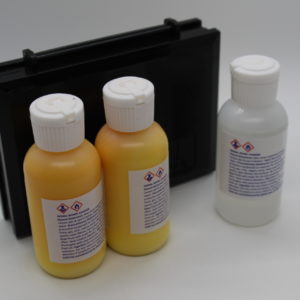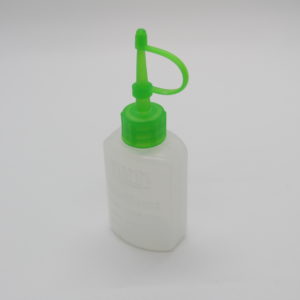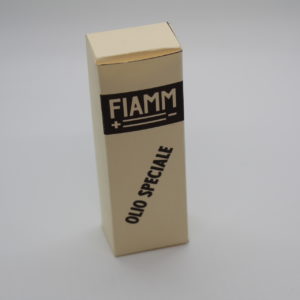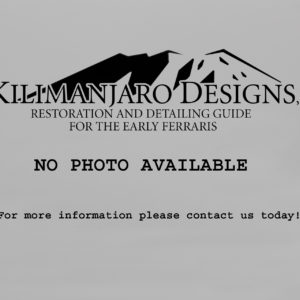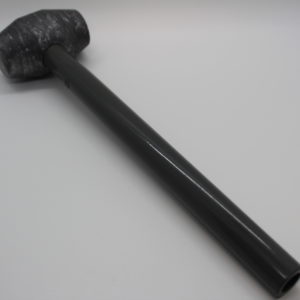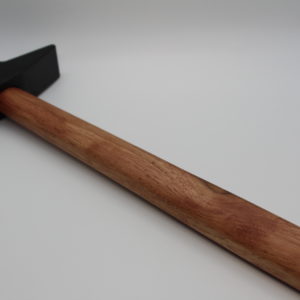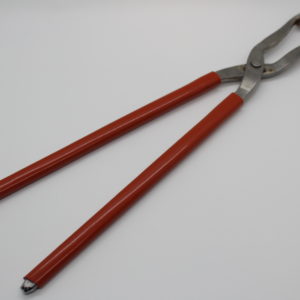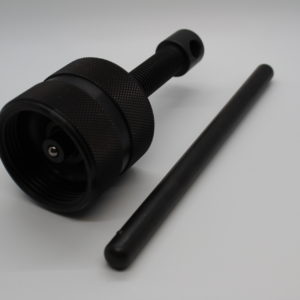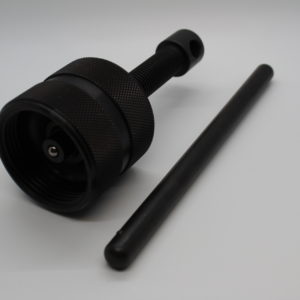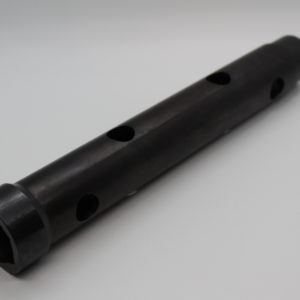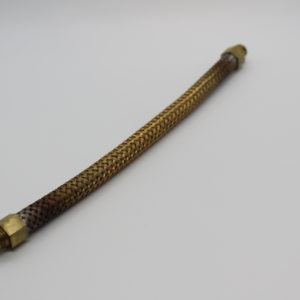Authentic Tools and Accessories
Showing 1–24 of 26 results
-
43 | Coil resistor stamp kits
$75.00The red coils were introduced at about the same time as the outside plug engines. There were two configurations. The early types are usually referred as the “Tootsie Roll” coils because they used a tubular shaped resistor similar to the Tootsie Roll candy. The second type used a square ceramic resistor which had the ohm rating silk screened on the top surface (the surface toward the attaching studs for the wires). This kit contains the yellow paint, stamp pad, solvent and a hand stamp reproducing the ohm silk screened pattern from a 250 GTE. 250 Coil Resistor Stamp Kit
Read more -
48 | Fiamm horn compressor oil bottle
$350.00These small oil bottles were supplied in the tool bags in a little cardboard box for cars having the Fiamm horns. The originals that I have seen were from 275 series cars. Fiamm Horn Compressor Oil Bottle.
Add to cart -
49 | Fiamm oil bottle box
$25.00This is a little box supplied by Fiamm with the oil bottle, in the tool kits. Fiamm Oil Bottle Box
Read more -
104A | Early two piece canvas bags
$1,350.00The very early cars used two separate dark red canvas bags, one for the hand tools and the second one for the jack. The later 250 cars used a single bag made of synthetic “leather”. There was a variety of bag configurations for the 250 cars until Ferrari reverted to the two-bag configuration with the late 330s. All of the 250 bags that I have seen are black with a pebble grain texture (like a football). The later 275 and 330 bags are typically smooth, in either black or dark brown. These bags are perfect with hand made buckles and every original detail. The bags are made to order so please allow 6 weeks for delivery. Early Two Piece Canvas Bags
Read more -
104B | 250 tool bags, inside plug, outside plug, three different patterns
$1,350.00The very early cars used two separate dark red canvas bags, one for the hand tools and the second one for the jack. The later 250 cars used a single bag made of synthetic “leather”. There was a variety of bag configurations for the 250 cars until Ferrari reverted to the two-bag configuration with the late 330s. All of the 250 bags that I have seen are black with a pebble grain texture (like a football). The later 275 and 330 bags are typically smooth, in either black or dark brown. These bags are perfect with hand made buckles and every original detail. The bags are made to order so please allow 6 weeks for delivery. 250 Tool Bags, Inside Plug, Outside Plug, Three Different Patterns.
Read more -
104C | 275/300 tool bag, black, smooth finish, single bag
$1,350.00The very early cars used two separate dark red canvas bags, one for the hand tools and the second one for the jack. The later 250 cars used a single bag made of synthetic “leather”. There was a variety of bag configurations for the 250 cars until Ferrari reverted to the two-bag configuration with the late 330s. All of the 250 bags that I have seen are black with a pebble grain texture (like a football). The later 275 and 330 bags are typically smooth, in either black or dark brown. These bags are perfect with hand made buckles and every original detail. The bags are made to order so please allow 6 weeks for delivery. 275/330 Tool Bag, Black, Smooth Finish, Single Bag.
Read more -
105A | Early 250 Design (from an early 250mm)
$150.00From the early 1920s until the mid 1960s the Rudge-Whitworth design wire wheels were the standard for almost all race cars. Ferrari chose them for the street and race cars and used them as standard equipment or an option through the Daytona series in the early 1970s. The Rudge-Whitworth design wheels were made in Milan as Carlo Borrani wheels until 1961 and as Ruote Borrani after that. They were made with splined hubs and were attached with a central locking nut with two ears and later three ears. These wheel nuts or knock-offs were designed to be removed using a lead hammer. Several different designs were used throughout the years. Early 250 Design (from an early 250mm)
Add to cart -
105B | Inside plug 250 (from an early P.F. spyder)
$150.00From the early 1920s until the mid 1960s the Rudge-Whitworth design wire wheels were the standard for almost all race cars. Ferrari chose them for the street and race cars and used them as standard equipment or an option through the Daytona series in the early 1970s. The Rudge-Whitworth design wheels were made in Milan as Carlo Borrani wheels until 1961 and as Ruote Borrani after that. They were made with splined hubs and were attached with a central locking nut with two ears and later three ears. These wheel nuts or knock-offs were designed to be removed using a lead hammer. Several different designs were used throughout the years. Inside Plug 250 (from and early P.F. Spyder)
Add to cart -
105C | Late 250 GTE type
$150.00From the early 1920s until the mid 1960s the Rudge-Whitworth design wire wheels were the standard for almost all race cars. Ferrari chose them for the street and race cars and used them as standard equipment or an option through the Daytona series in the early 1970s. The Rudge-Whitworth design wheels were made in Milan as Carlo Borrani wheels until 1961 and as Ruote Borrani after that. They were made with splined hubs and were attached with a central locking nut with two ears and later three ears. These wheel nuts or knock-offs were designed to be removed using a lead hammer. Several different designs were used throughout the years. Late 250 GTE Type.
Read more -
105D | 275/330 Type
$150.00From the early 1920s until the mid 1960s the Rudge-Whitworth design wire wheels were the standard for almost all race cars. Ferrari chose them for the street and race cars and used them as standard equipment or an option through the Daytona series in the early 1970s. The Rudge-Whitworth design wheels were made in Milan as Carlo Borrani wheels until 1961 and as Ruote Borrani after that. They were made with splined hubs and were attached with a central locking nut with two ears and later three ears. These wheel nuts or knock-offs were designed to be removed using a lead hammer. Several different designs were used throughout the years. 275/330 Type.
Read more -
106 | Steel hammer
$150.00The tool kits also contained a steel hammer, the 500 gram “French Pattern Carpenter’s Hammer”. This type of hammer is fairly common in France and northern Italy. There were several suppliers over the years and slight differences in all of them. This is a perfect reproduction of one of the originals. These steel hammers will damage the “Knock-offs” and should not be used on them. 500 Gram French Pattern Steel Hammer
Add to cart -
107A | Black spark plug boot tongs
$600.00The inside plug twelve cylinder cars had a set of tongs that was used to pull off the spark plug boots when changing the plugs. The plugs were located “inside” the V of the engine between the intake manifolds and were very hard to reach by hand, particularly on a hot racing engine. The early tongs were black. After about 1957 the later tongs were cad-plated. Black Spark Plugs Boot Tongs
Add to cart -
107B | Plated spark plug boot tongs
$600.00The inside plug twelve cylinder cars had a set of tongs that was used to pull off the spark plug boots when changing the plugs. The plugs were located “inside” the V of the engine between the intake manifolds and were very hard to reach by hand, particularly on a hot racing engine. The early tongs were black. After about 1957 the later tongs were cad-plated. Plated Spark Plug Boot Tongs
Add to cart -
108A | R.W. 42 Hub puller
$500.00The Rudge – Whitworth type hubs use regular machine – type bearings and require a hub puller to remove the brake drums or discs. Two size were common to most Ferraris. The R.W. 42 design was used on most of the cars, while a smaller R.W. 32 design was used on the 275s and the 330 G.T.C.s. R.W. 42 Hub Puller
Read more -
108B | R.W. 32 Hub puller for the 275s and 330 G.T.C.s
$500.00The Rudge – Whitworth type hubs use regular machine – type bearings and require a hub puller to remove the brake drums or discs. Two size were common to most Ferraris. The R.W. 42 design was used on most of the cars, while a smaller R.W. 32 design was used on the 275s and the 330 G.T.C.s.R.W. 32 Hub Puller for the 275s and 330 G.T.C.s
Read more -
109 | “Chiave per Tambura”
$450.00Part #84066 for the inside plug 250s and earlier cars
Add to cart -
110B | Late grease gun for 250s and later cars with the flat, cast handle
$500.00Two types of grease guns were used for the 250 series cars. The type with the lathe turned handle was appropriate for the inside plug 250s and most of the earlier cars. The very early cars probably used something similar, but perhaps from a different manufacturer. The late, outside plug 250s and other later cars used the grease gun with the flat, cast handles. Late Grease Gun for 250s and later cars with the flat, cast handle.
Read more -
111A | Bronze – Woven grease gun hose for the early cars
$150.00The tool kits also contained a short flexible hose to be attached to the grease guns for rountine lubrication of the chassis. The early ones had a bronze woven exterior. The later ones had the brass hose plated with Cadmium. Bronze – Woven Grease Gun Hose for the early cars
Add to cart


